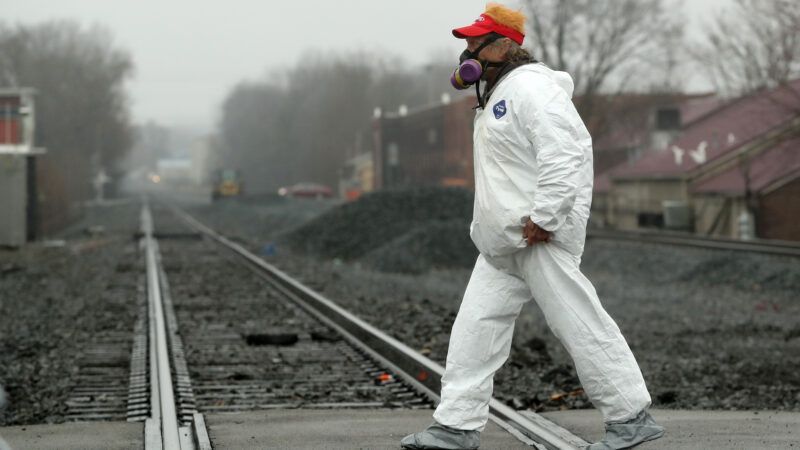New NTSB Report Highlights Useless, Premature Regulatory Push After East Palestine Derailment
New NTSB Report Highlights Useless, Premature Regulatory Push After East Palestine Derailment

(AARON JOSEFCZYK/UPI/Newscom)
The latest report from safety officials investigating the freight train derailment in East Palestine, Ohio, shows that the left and right's post-accident regulatory proposals likely would have done nothing to prevent the crash.
A preliminary report issued by the National Transportation Safety Board (NTSB) on Thursday suggests a mechanical issue with an overheated wheel bearing was to blame for the accident.
The report says that track sensors detected a wheel bearing on the Norfolk Southern train was heating up rapidly as it traveled through eastern Ohio. When a sensor alerted the crew that the bearing's temperature hit 253 degrees above the ambient temperature, they brought the train to a halt to inspect the problem.
During their braking procedure, the train's automatic brakes were triggered—which likely meant the train had already derailed by the time the crew was bringing it to a stop.
This is just a preliminary report. It doesn't identify what caused the train's wheel bearing to overheat in the first place. But it does suggest that most of the post-accident commentary has been disconnected from the actual causes of the accident.
Prior to the release of the NTSB report, the White House and the mediahave been eager to pin the cause of the disaster on various deregulatory moves made by the Trump administration.
In particular, they've pointed to the Trump administration's revocation of an Obama-era rule that would have required Electronically Controlled Pneumatic (ECP) brakes on all trains carrying exclusively high-flammable cargo.
The revocation of that rule wasn't just an initiative of the Trump administration, however. The 2015 FAST Act required the administration to perform a cost-benefit analysis of requiring ECP brakes, and not go forward with the mandate if it didn't pass that cost-benefit analysis. A congressional watchdog report in 2016 found that the Obama administration had implemented its ECP mandate without doing a thorough enough analysis of the technology's costs and performance.
That's all kind of beside the point, however. Even if the ECP rule had been in place, it wouldn't have applied to the train that derailed in East Palestine. That train was carrying mixed cargo without enough high-flammable cargo-containing cars to trigger the old ECP rule.
On February 16, NTSB director Jennifer Homendy said people blaming the accident on the repeal of the ECP rule were spreading"misinformation."
The ECP braking rule would've applied ONLY to HIGH HAZARD FLAMMABLE TRAINS. The train that derailed in East Palestine was a MIXED FREIGHT TRAIN containing only 3 placarded Class 3 flammable liquids cars. pic.twitter.com/ReAFDSdsn7
— Jennifer Homendy (@JenniferHomendy) February 17, 2023
That hasn't stopped the White House from citing the repeal of the ECP rule to USA Today on February 22 as an example of Republicans' efforts to undermine rail safety.
On the right, Sens. Marco Rubio (R–Fla.) and J.D. Vance (R–Ohio) sent a letter to Department of Transportation Secretary Pete Buttigieg demanding he investigate railroads' use of precision-scheduled railroading (PSR).
Rubio and Vance hone in on PSR's alleged reduction in the number of railroad workers per train for harming safety, writing "it is not unreasonable to ask whether a crew of two rail workers, plus one trainee, is able to effectively monitor 150 cars."
This earned the two senators a glowing write-up in The American Conservative, which said their letter was a sign of "serious populism."
PSR is a nebulous term for a lot of different practices railroads have adopted to use their assets more efficiently, says Marc Scribner, a senior transportation policy analyst with Reason Foundation (the nonprofit that publishes this website). "It's kind of a boogeyman that's a stand-in for everything [people] don't like about the railroads."
Scribner says that PSR is getting a lot of blame for a drop in railroad workers that was in fact caused by layoffs and early retirements during the chaos of the pandemic. And given that the East Palestine derailment appears to have been caused by a mechanical failure of a wheel bearing, it's not clear at all that more workers per train would have prevented it.
In response to Rubio's criticism, Buttigieg accused the senator of hypocrisy because he supported greater use of automated track safety inspections.
The facts don't lie. The 2021 letter you signed was obviously drafted by railroad industry lobbyists.
It supports waivers that would reduce visual track inspections.
Now: will you vote to help us toughen rail safety accountability and fines, or not? https://t.co/o5MGvbEZbA
— Secretary Pete Buttigieg (@SecretaryPete) February 21, 2023
Federal rules require human-performed visual track inspections. In the past few years, the Federal Railroad Administration (FRA) has allowed a number of railroads to conduct pilot programs whereby the railroads reduced the number of human-performed inspections and increased the number of automated inspections.
Those pilot programs proved successful in that the automated inspections found more defects than visual human inspections, says Scribner. The hope of these programs was that they would free up visual inspectors to examine signals and other track components that can't be inspected by automated technology. Doing that should improve safety.
But Biden's FRA killed these pilot programs. In 2021, Rubio and 22 other senators signed a letter asking that these pilot programs be continued. They weren't.
Buttigieg bringing that up as an example of Republican safety regulation–slashing is disingenuous. It's particularly egregious given that there's been no indication thus far that track defects (that these inspections, human or automated, would detect) had anything to do with the East Palestine derailment.
That so much of this mudslinging happened prior to the preliminary NTSB report on the accident is telling. It shows that most of the finger-pointing and regulatory gotchas happening right now are more about political point-scoring than safety.
That's certainly unseemly. If it leads to a bunch of ill-considered regulations being applied to freight rail companies, it could be quite costly too.




Post a Comment